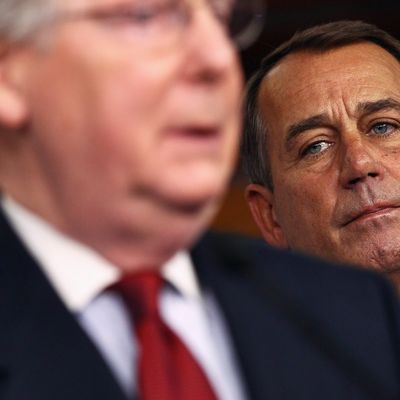
Fifty years ago, the philosopher Abraham Kaplan used what was already an old joke to describe a social science phenomenon. The old joke is a drunk man searching under a lamppost for his missing keys late at night, which he later reveals to have lost somewhere else entirely, but he is searching under the lamppost because that’s the only place that is illuminated. Kaplan argued that “the principle of the drunkard’s search” describes a great deal of behavioral science. It certainly explains how people are thinking about Washington and the midterm elections.
Washington is gridlocked for a simple reason: President Obama and the Republican majority in the House of Representatives can’t agree on any legislation. Or, to put it in less neutral terms, President Obama and the Republican majority in the House of Representatives can’t agree on whether Obama is a socialistic tyrant who poses a fundamental threat to American freedom and must be stopped at all costs. Or, to put it in even more opinionated (but, I’d maintain, even more accurate) terms, the Republicans in the House are, by and large, barking mad.
The barking madness of the House Republicans stands in the way of Congress passing even relatively popular measures that command bipartisan support, like investing in transportation infrastructure, or some form of immigration reform. If Democrats gained control of the House, those sorts of measures would pass. Alas, Democrats stand no chance of gaining control of the House. The House map, which packs Democratic voters into urban districts where their votes are wasted on overwhelming margins, makes the Republican majority invulnerable to anything but an overwhelming national landslide. (Republicans hold a 33-seat majority in the House despite having garnered 1.1 million fewer votes.) Democrats aren’t even pretending they have a chance to win the House anymore.
And so people who want to pass bills are looking on the side of the street where the streetlights are on, rather than where the keys are located. Some pro-compromise figures have speculated on Obama, whose frustration with gridlock they see as a cause of gridlock. A Politico story about Obama’s frustration quotes both Democrats, who think Obama can end gridlock by attacking Republicans publicly, and Republicans, who think he can end it by treating them more nicely. (Bob Corker, a frustrated dealmaking Republican, says, “if he can get motivated and reenergized, I think this is a tremendous opportunity for the country.”)
Most of the focus has centered on the Senate, which is up for grabs. Moderate Republicans have hopefully speculated that their gaining control of the chamber will somehow allow more dealmaking. Mitt Romney says that a Republican Senate will somehow allow immigration reform to pass, despite the fact that the Senate already passed immigration reform while Democrats had the majority, and the Republican-controlled House passed nothing. Lindsey Graham, another dealmaking Republican, believes that a Republican Senate will find a way to reach a Grand Bargain. (“I’m willing as a Republican to violate some of the pledges we’ve all made,” he offers.) Of course, Graham has always been willing to do this. The House remains unwilling. If the House could make a deal with Obama, the Senate would sign on to the deal if it were controlled by Republicans or if it were controlled by Democrats. Gridlock will continue through the next Congress regardless of the Senate race.
Indeed, gridlock will continue after 2016 as well, unless Republicans win the presidency (in which case the House will churn out Republican bills for signing, as it did under George W. Bush). To get a sense of just how grim the picture is for Democrats, Benjy Sarlin reported several months ago on a Democratic plan to try to win back the House in 2020. The year 2020 is not picked out of a hat. It coincides with the next Census, which will redraw the House map. Sarlin’s reporting makes it pretty clear the Democrats don’t have an especially good chance of winning back the House in 2020 — it’s simply the next time such a prospect becomes even faintly imaginable.
The prospect is simply too depressing to contemplate for anybody who wants Congress to function. And so they are obsessing over the election where the outcome is being contested, rather than the election where the outcome would actually make a difference.






























